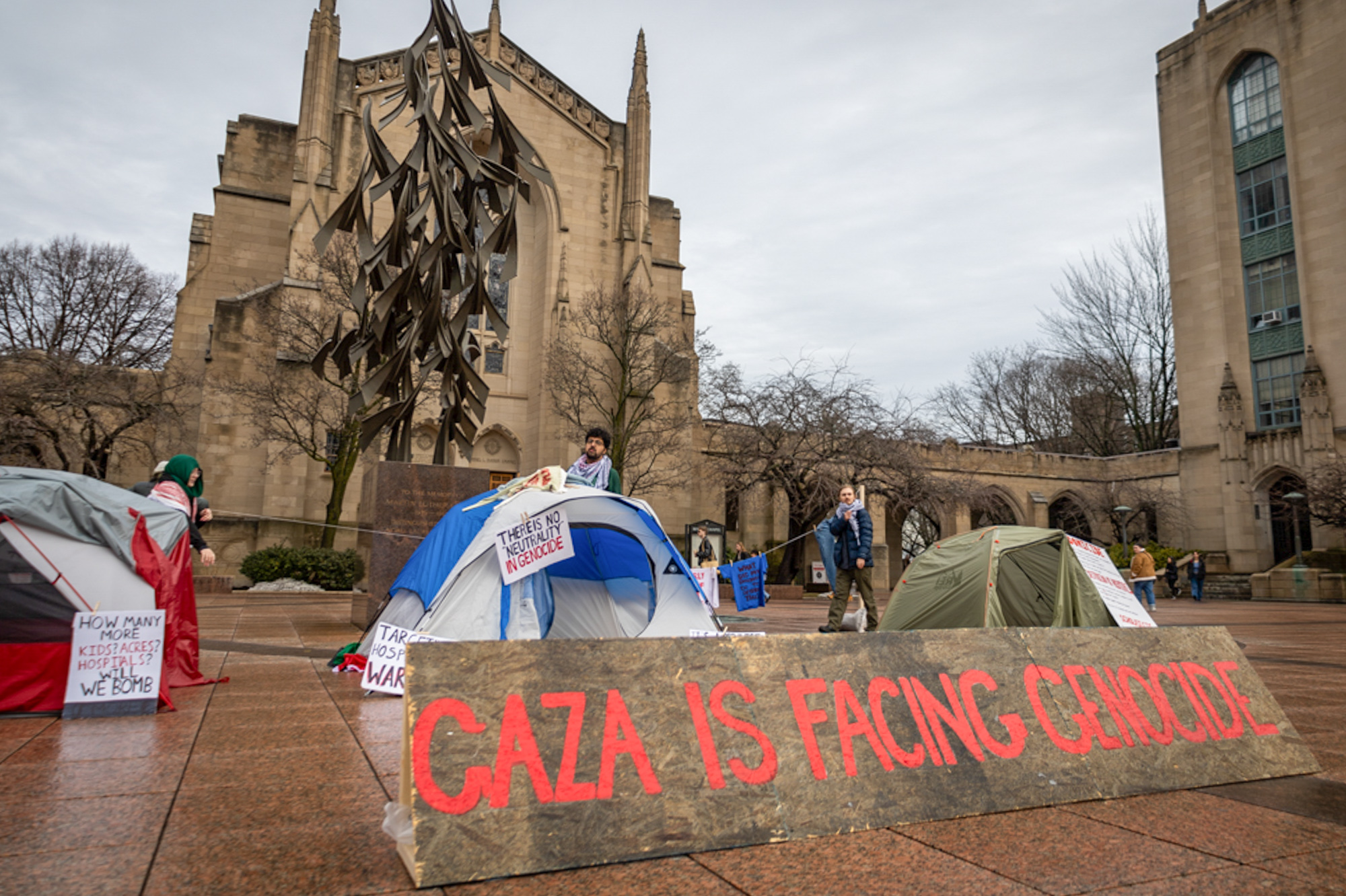Boston University Students for Justice in Palestine set up tents in a demonstration at Marsh Chapel Thursday to represent the conditions of displaced individuals in Gaza.
The demonstration is a part of a “global week of action” by SJP chapters across universities in Boston in response to Bisan Oudeh, an advocate for women’s rights in Gaza who lost her home and workplace in the bombings, according to an Instagram post by BU SJP and Emerson SJP.

“These camps lack basic essentials like sanitation, access to food, and proper protection from weather,” the post reads. “The war crimes against Gaza are so insidious that a new word has come to describe them: “domicide” — the arbitrary attacking, bombing, and shelling of housing to decimate entire cities and villages.”
Fatimah Bouderdaben, a doctoral student at the Graduate School of Arts and Sciences, said the tent installation reflects the injured and displaced people in Gaza and is “bringing awareness to other effects besides death.”
“We’re looking at over 1.9 million people who are displaced in Gaza currently,” Bouderdaben said. “But, even before Oct. 7, Gazans were displaced and living in tents because they were kicked out of their homes and other parts of occupied Palestine.”
Students on campus expressed how important it is to have these protests on campus.
Emma Galletta, a master student in the Frederick S. Pardee School of Global Studies, said it was vital to have statements in public areas on campus where visitors can stop and observe.
“If folks aren’t informed and aren’t educated, it’s a good way to kind of draw attention to what’s going on,” Galletta said.
Galletta also attended the SJP-organized sit-in on Nov. 9, where students listed names of Palestinian civilians killed in Gaza at the College of Arts and Sciences, and said the event was “a beautiful thing to be a part of.”
“I think that as a university we have a right to make a more powerful statement that does defend Palestinians and also groups like SJP,” Galletta said.
A student, who asked their name be withheld, said having a “visual representation with actual statistics” of displaced and injured Gazans will initiate conversations between people.
“Change will not really happen unless people actually educate themselves and engage in conversations with the people around them,” the student said. “If everyone kind of gets on the same agenda, then we can all move forward to making changes.”
In regards to a recent email BU Interim President Kenneth Freemen sent out addressing the Israeli-Palestinian conflict, Bouderaben said there were issues that BU had previously failed to address.
“They acknowledged Islamophobia for once, which is something that they have never done before,” Bouderaben said. “And they named that people were doxxed, which is something that they haven’t acknowledged before.”
However, Bouderdaben said she felt the message put “the feelings of pro-Israelis at the same level as the unsafety that pro-Palestinan students have faced by doxxing.”
“I feel like that is not an equivalent that they should have made,” Bouderben said.
Christian Rodriguez, a senior in Sargent College of Health and Rehabilitation Sciences, said Freeman’s message was “predictably soft” because of the neutral stance.
“I think it’s the fact that not taking a stance is taking a stance,” Rodriguez said.
Another student who asked their name be withheld said the university has ignored “pretty extreme instances” of Islamophobia, racism and students being doxxed.
“BU, in an effort to remain impartial, has kind of swept those under the rug,” they said.
Sophie Cutter, a junior in the College of Arts and Sciences, said she hopes the demonstration creates “more empathy on campus” and that people will become more comfortable talking about it.
“In general, I hope that Palestinians get peace, security and autonomy one day and that people stop dehumanizing Palestinians and what’s going on right now in the West Bank and Gaza,” Cutter said.
Kiera McDonald contributed to the reporting of this article.


















































































































